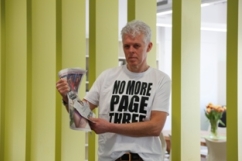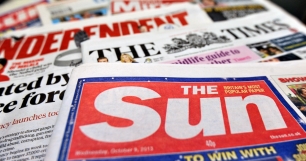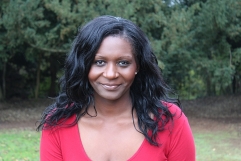I've always loved The Sun. My family returned from the West Indies in the 1960s, and soon after that Rupert Murdoch bought the paper. This was a subject of great debate at my grandmother's house in Sussex, where she was the secretary of the local Labour Party. Having learned to my shock that women could not be priests, I had abandoned all idea of following my father into the Church. The witty headlines and sharp stories in The Sun, which the discussions in our home made me avid to read, inspired me to become a journalist instead.
By the time I was a teenager, riding and mucking out for racing stables near Uttoxeter every Saturday, Page 3 was a popular, regular item. The stable lads and head groom liked to ogle and chuckle during tea breaks, while refusing to let me see. The last thing they wanted was a complaint from the local vicar about the influences his daughter was being exposed to.
To me, though, Page 3 seemed at once innocent, slightly embarrassing, and also irrelevant. Back home we did not take The Sun, or The Times, just the Uttoxeter Advertiser, which still ran classified advertisements on the front page. This became my first paper. We vicarage girls were encouraged by our ardently feminist mother to read Marilyn French's Fear of Flying and Germaine Greer's The Female Eunuch. I found the cover of Greer's book, a naked female torso hung out to dry on washing line, far more shocking than anything my curious eyes managed to glimpse in The Sun.
But Page 3 is upsetting, and for obvious reasons. A friend once described to me how her confidence had been eroded as she grew up with The Sun in the house every day, unable to help herself from making constant comparisons between herself and the Page 3 girls. Many similar stories have been told online in recent days.
Nearly 223,000 had signed the #NoMorePage3 Change.Org petition by midday today. The aim is to get this to a million. Hundreds more had signed just in the wake of the reapparance of Page 3 under a "clarification and correction" after the few days' absence this week. In a moving plea on the site, founder Lucy Holmes writes to David Dinsmore, editor of The Sun: "David, stop showing topless pictures of young women in Britain's most widely read newspaper, stop conditioning your readers to view women as sex objects. Enough is enough."
The Sun remains a phenomenally successful newspaper, with an average daily circulation of 2.2 million copies in March 2014 and more than five million daily readers, with more than four in ten of these being women. But like all newspapers, it is affected by the developments in the online world. It joined its sister newspaper The Times behind a paywall recently.
The pressure on all newspapers to find a way to retain advertising revenue is growing month on month. To counter this, among other things newspapers must surely develop a good ethnic mix among their readers in multi-cultural Britain.
Although religious practice is as much under pressure as newspaper readership, there are many people still who do both have a faith and wish to read a newspaper. Surely many of these, and not just people of the Muslim faith with a strong tradition of modest female dress, are unlikely to buy The Sun while simply opening the paper risks exposing them and their family to an image that, however beautiful and natural, can only be distracting.
The story that The Sun was dropping Page 3 was broken by The Times, which indicated the move had the backing of News UK boss Rupert Murdoch himself. As a former Times employee, I can attest it is inconceivable this story would have been published without being impeccably sourced.
For a businessman such as Murdoch, the wishes of the readers are paramount. The Sun is perfectly pitched at the heart of that tantalising grey area of ethical and commercial tension, where public interest ends and the interest of the public begins. The controversy itself has generated floods of online traffic to the website. If Page 3 in the paper and online can propel subscriptions up it will remain. Not until it seems commercially the better option will the topless girls disappear for good. My guess is that day might not be too far off.
Ruth Gledhill was a journalist at The Times for 27 years and is now a Contributing Editor at Christian Today.

















